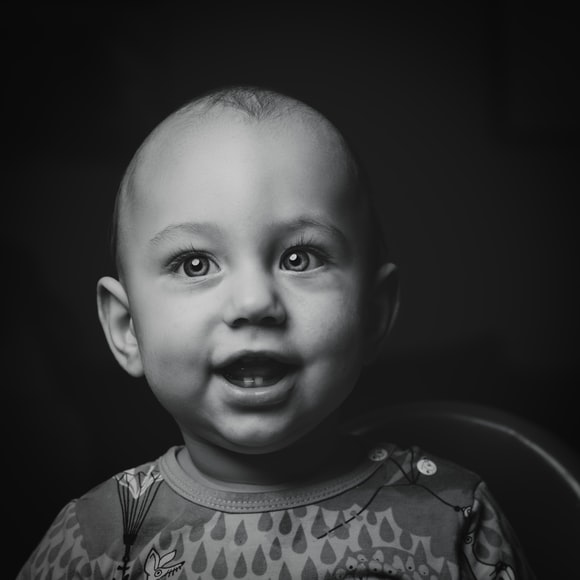When you’re expecting your first child, you soon realize that pregnancy is an extensive learning journey in itself. At every juncture, new questions arise. For instance, most people would normally assume that babies are born toothless. While you may wonder whether babies can be born with natal teeth.
To give you the short answer: Yes. It is a possibility. Rare, though, but very far from impossible. Teeth that are present at birth are called natal teeth. They are normal, and according to a 2006 study, about one in 2000-3500 infants is affected by them. Natal teeth are a benign complication that doesn’t necessarily pose a considerable problem. It’s worth knowing how to take care of it, as well as the possible issues that may arise from the presence of these teeth. Read on for more information about these weird teeth.
What are natal teeth?
As you probably already know, a baby’s primary teeth are expected to begin coming in at around their sixth month. The teething process is typically accompanied by discomfort caused by soreness in the gums, a mild temperature, and other symptoms that naturally make the little one a bit more fretful, so it’s hard to miss what’s going on.
Natal teeth may or may not look the same as normal primary teeth. They are quite different in that they are already present at birth. We are generally talking about natal teeth in the plural. It is definitely worth mentioning that you probably won’t be seeing a newborn with any more than two teeth. These teeth typically come in pairs, and most often, it is the lower central incisors that make this unexpected appearance. As we mentioned, natal teeth are rare, but not extremely rare. The previously mentioned study also notes that females are more likely to have natal teeth at birth than males.
In addition, besides being born with a tooth or two, on an even rarer occasion, an infant may develop teeth very shortly after birth. Teeth that emerge within the first 30 days of an infant’s life are referred to as neonatal teeth and they have similar characteristics as natal teeth. Therefore, they usually require the same care as well. The eruption of neonatal teeth is not accompanied by the aforementioned normal teething symptoms, so it may cause surprise.
Characteristics of natal teeth
We mentioned that natal teeth may or may not look like regular primary teeth. The fact of the matter is that regardless of their appearance, natal teeth are, understandably, a little less developed than primary teeth. They often don’t have a developed root structure, which makes them wobbly. In some cases, they may entirely lack roots and may only be connected to the gums with soft tissue. Additionally, they may also be small and yellow or brown.
In literature, two types of natal teeth are differentiated based on their maturity and four types based on their appearance. Knowing which one your newborn is affected by is useful in deciding what to do next. Finally, it should be mentioned that natal teeth may or may not be simply the prematurely emerged primary teeth of your baby. In a low number of cases, natal teeth are actually extra teeth, otherwise called supernumerary teeth.
Diagnosing natal teeth
The diagnosis of natal teeth is a quite straightforward process. The doctor will look into your baby’s mouth to look for any signs. If the tooth has fully emerged, naturally, it will be immediately visible, and they will be able to advise you on further steps right away. However, natal teeth may also be only partially emerged or even just below the surface of the gums, and they may require a keen eye to detect in that case.
Your doctor might request an X-ray if they suspect the presence of teeth under the gums. An X-ray can also help assess the root development of the teeth present. Additionally, this step may also be necessary in order to determine whether the tooth is supernumerary and would cause issues down the line when the baby’s real primary teeth start coming in.
Possible complications
What you are probably the most curious about is whether natal teeth are harmless or whether they pose any risk for further complications. Here are the most important considerations:
- Since natal teeth are usually wobbly, what should be determined right away is whether the tooth is so wobbly that it poses the dangers of falling out by itself. If that is the case, your baby may inhale the tooth while feeding, which can lead to suffocation. While this is generally considered unlikely, you probably don’t want to risk it.
- The presence of natal teeth can also cause irritation to the baby’s tongue. Since the mentioned teeth are often cone-shaped, they can be rather sharp and hurt the baby’s tongue while feeding. When this irritation is continued, it can lead to tongue conditions. That will not only be painful but will also make feeding difficult for the child.
- The presence of natal teeth is not exactly a desirable situation from the mother’s point of view either. When nursing, the tooth or teeth can cause irritation and discomfort.
- In case an X-ray confirms that the teeth in question are supernumerary, their presence can also lead to crowding later on.
Should you do something about it?
As we just discussed, these teeth can have some degree of risk, so you may be wondering whether you should do something about them. If so, what. The three options that are present are extraction, smoothening, and leaving the tooth alone.
In case the tooth is extremely wobbly, the doctor may extract it shortly after birth when the baby is still at the hospital. If that isn’t the case, you can also make the call yourself and seek out a dentist who will advise you on the best course of action. If there is no particular reason to remove the tooth, some recommend leaving it alone so as not to endanger the permanent tooth buds that are already formed during pregnancy. So, if the tooth isn’t wobbly and your dentist agrees that no extraction is necessary, they may smoothen it instead to prevent the aforementioned tongue irritation. An experienced kids dentist can also advise you on how to care for the baby’s teeth to keep them healthy.
Causes of the development
Even today, natal teeth are quite mysterious. Sometimes, their cause is unknown. It has been observed that there may be a genetic factor. So, if your first baby is born with natal teeth, your second child has a higher chance to also be equipped with a pair at birth, too. Babies with a cleft palate or lip are also more likely to have this kind of teeth. Additionally, some underlying health conditions that affect growth might also have a relation. These include syndromes like Hallerman-Streiff, Ellis-van Creveld, Jadassohn-Lewandowski, and others.
Natal teeth are a curious phenomenon that is not as rare as one would think. If your baby is born with a tooth or two, doctors will be able to advise you on the best course of action.

